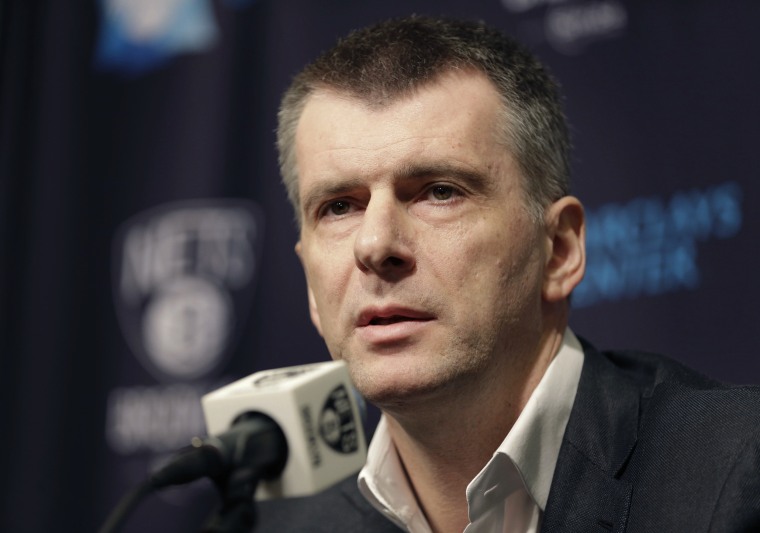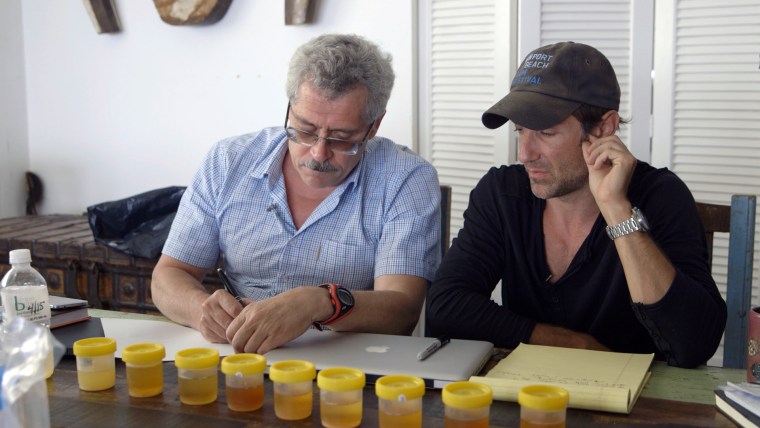The Russian oligarch who owns the Brooklyn Nets is backing a lawsuit filed by three Russian athletes against the main whistleblower in Russia's doping scandal in hopes the whistleblower will be forced to make his accusations in a U.S. courtroom.
The whistleblower, Grigory Rodchenkov, is now in a U.S. witness protection program. His testimony helped convince the International Olympic Committee (IOC) to strip Russia of participation in the 2018 PyeongChang Winter Games.
Three Russian biathletes who were banned from Olympic competition because of alleged doping are seeking $10 million apiece in a suit filed Tuesday in a New York state court.
"The objective of the litigation is twofold," said Scott S. Balber, attorney for the plaintiffs. "Obviously, we want to adjudicate the matter, but we also want full-fledged discovery, documents and depositions to demonstrate the falsity of [Rodchenko's] claims."
Nets owner Mikhail Prokhorov was the chief promoter of the Russian biathlon program in the run-up to the 2014 Winter Olympics, which were held in the southern Russian resort city of Sochi. A source familiar with his role told NBC News that he is the chief financial backer of the lawsuit.
After the first of the three biathletes, all women, were banned by the IOC in September 2017, Prokhorov said he would be willing to finance such a suit.
"I am sure that one of the court proceedings could be opened in the United States, [where] Rodchenkov can be questioned during the trial," Prokhorov told TASS. "Our athletes should have an opportunity to personally face the man whose words provided the basis for the outrage of sporting lawlessness."
"I am prepared to hire the best lawyers to defend the interests of our biathletes in any country of the world, where it will be most appropriate," he added.
In December, the Wall Street Journal reported Rodchenkov alleged in sworn testimony that Prokhorov paid a Russian biathlete millions of rubles not to disclose the elaborate doping scheme. Prokhorov vehemently denied the story.

Although the suit has a limited chance of success, Prokhorov and the plaintiffs want to make Rodchenkov "face his accusers," said the source. They want to force him to give sworn testimony in depositions or, if the case reaches trial, in open court.
Balber said he expects the Justice Department to fight to keep Rodchenkov off the stand. The DOJ said the U.S. government "does not confirm or deny the participation of anyone in the Witness Security Program," and declined to comment on the suit.
According to senior law enforcement officials, Rodchenkov is helping prosecutors with criminal investigations in the U.S. and elsewhere. He has been in witness protection in the U.S. since 2016. He is helping prosecutors in criminal investigations in the United States and elsewhere, according to senior law enforcement officials.
Rodchenkov said he gave cocktails of banned steroids to athletes and swapped tainted samples for clean urine on orders from Russian state sports officials. He said he was instrumental in Russia's government-funded doping program, and that his program allowed Russia to overwhelm the competition during the 2014 Sochi Winter Olympics, where Russia won 33 medals.
Independent investigations by the World Anti-Doping Agency and more recently the International Olympic Committee have backed Rodchenkov's claims. He has been interviewed repeatedly by the New York Times, featured on "60 Minutes" and was profiled in a documentary called "Icarus."
The Russian government denies ever supporting doping and in fact indicted him in absentia in 2016 for illegal drug trafficking and later on "abuse of power" charges. On Monday, Moscow City Court upheld a ruling to detain Russian doping whistleblower Rodchenkov on the drug trafficking charges.

The three biathletes, all now retired from international competition, are Olga Zaytseva, Yana Romanova and Olga Vilukhina. Zaytseva is the most prominent of the three, having won two golds and a silver medal at both the Torino Olympics in 2006 and the Vancouver Olympics in 2010.
The suit filed Tuesday refers to Rodchenkov as a "career criminal, liar and cheat" and that in his "false statements" to the New York Times "began the process of destroying careers and reputations that had been decades in the making."
Andrew Weiss of the Carnegie Endowment for International Peace said Russian oligarchs have not used the U.S. court system very often, relying instead on the British courts with their "more favorable British legal standards on what constitutes libel or defamation."
Weiss added that the libel suit aligned Prokhorov with Russian President Vladimir Putin, despite previous conflicts.
"Rodchenkov is Enemy Number One in Moscow these days and the government has launched a full-scale effort to make him, not the secret state-sponsored doping program, the focal point of their rebuttal to the IOC's decision to ban Russian Olympic athletes," said Weiss.
"For someone like Prokhorov, who's had his share of run-ins with the authorities in recent years, the defamation suit is, regardless of the merits, an easy way to show the Kremlin that he's eager to use his own money to defend Russia's international reputation and to try to knock Rodchenkov and the IOC down a peg."